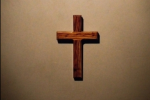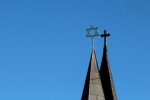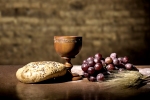June 24, 2020
Sam Dessordi Peres Leite Shares Five Resources on Multi-Cultural Congregations

Every month ECFVP offers five resources on a theme. This month we've asked The Rev. Sam Dessórdi Peres Leite, who serves as the Senior Priest at St. Stephen and the Incarnation Episcopal Church in Washington, D.C., to choose five resources that resonated with him. Please find his choices below. Please share this email with new members of your vestry and extend an invitation to subscribe to ECF Vital Practices to receive Vestry Papers and this monthly digest.
Over the years, many people have said to me that multicultural congregations are challenging. In response, I have encouraged them to see diversity as an asset, as a new opportunity, and an element of power to enrich the Beloved Community.
And I speak of diversity not only from the cultural point-of-view but intergenerational and social as well. My current parish has the gifts of being multigenerational and trilingual, a diversity that mixes cultures from the bottom of the South American continent and the Caribbean to parts of Europe. It is a congregation that sits in the heart of the nation’s capital and brings together people who want to make a positive change in our society.
The first half of 2020 has become a season for new opportunities, to reimagine church life and its mission in new ways. Here are five articles I found insightful to my ministry and, perhaps, they will be to yours as well.
 1) Because COVID-19 has changed our way of being church, many of us are still looking for the key elements on which to focus during these days of social distancing. Alan Bentrup on Evangelism, Connection and Our New (Virtual) Reality gave us five thoughts on ways to lower our anxieties about how to minister to our churches.
1) Because COVID-19 has changed our way of being church, many of us are still looking for the key elements on which to focus during these days of social distancing. Alan Bentrup on Evangelism, Connection and Our New (Virtual) Reality gave us five thoughts on ways to lower our anxieties about how to minister to our churches.
 2) In a multilingual congregation, some misinformation and miscommunication is to be expected. It is hard to know how to react in the current realm of social media, but Annette Buchanan's article on Misinformation helps us to speak and share the truth more clearly.
2) In a multilingual congregation, some misinformation and miscommunication is to be expected. It is hard to know how to react in the current realm of social media, but Annette Buchanan's article on Misinformation helps us to speak and share the truth more clearly.
 3) Also from Annette Buchanan’s ministry, I was particularly impressed with her writings about how to engage in the conversation about racial justice in church, which led me to re-read her article, Responding to Injustice. This article has helped me in my own ministry and, even though it is not about today’s events, it offers some ideas on what can be done in the virtual realm. (Spoiler alert: you can also find her most recent article on ECFVP about Inequity and Injustice here.)
3) Also from Annette Buchanan’s ministry, I was particularly impressed with her writings about how to engage in the conversation about racial justice in church, which led me to re-read her article, Responding to Injustice. This article has helped me in my own ministry and, even though it is not about today’s events, it offers some ideas on what can be done in the virtual realm. (Spoiler alert: you can also find her most recent article on ECFVP about Inequity and Injustice here.)
 4) Hey! What about children and teens, right? While March and April were months to understand how to redesign the way we worship and how to respond to the pandemic, we are still trying to find ways to support our children and teens during this storm. Summer has arrived and the article, A Different Kind of Vacation Bible School by Liz Perraud, helps us with some excellent ideas for engaging children and their families in conversation about faith without leaving home.
4) Hey! What about children and teens, right? While March and April were months to understand how to redesign the way we worship and how to respond to the pandemic, we are still trying to find ways to support our children and teens during this storm. Summer has arrived and the article, A Different Kind of Vacation Bible School by Liz Perraud, helps us with some excellent ideas for engaging children and their families in conversation about faith without leaving home.
 5) Finally, I highly recommend the article, Icons: One Thousand Painted Prayers by my brother/friend Jemonde Taylor. In the past year my parish has been working on what we call “the Icons of Justice”. The rediscovery of the spirituality embedded in the use of icons to voice our Christian beliefs of justice and peace has been transformational. Ancient iconography is here to teach us to pray using relevant language, symbols and skin colors. Liturgical language must be contextual, and its symbolism must contain elements of social justice. It is part of our inheritance as followers of the Jesus Movement to proclaim that the kingdom of God liberates us from all instruments of death and injustice.
5) Finally, I highly recommend the article, Icons: One Thousand Painted Prayers by my brother/friend Jemonde Taylor. In the past year my parish has been working on what we call “the Icons of Justice”. The rediscovery of the spirituality embedded in the use of icons to voice our Christian beliefs of justice and peace has been transformational. Ancient iconography is here to teach us to pray using relevant language, symbols and skin colors. Liturgical language must be contextual, and its symbolism must contain elements of social justice. It is part of our inheritance as followers of the Jesus Movement to proclaim that the kingdom of God liberates us from all instruments of death and injustice.
The Rev. Sam Dessórdi Peres Leite serves as the Senior Priest at St. Stephen and the Incarnation Episcopal Church in Washington, D.C. This is not his first multicultural and bilingual parish. His former parish was St. James the Apostle in Oakland, CA. Sam Dessórdi has canonically transferred from the Episcopal Anglican Church of Brazil while finishing his D.Min. in 2013, Berkeley, CA. In his Master of Theological Studies program, he explored themes on liturgical inculturation and the Daily Office; and his Doctoral degree was focused on the vocation of The Episcopal Church towards the Latino population in the U.S. Currently, he is a member of the diocesan Liturgy Committee. He became an ECF Fellow in 2011.





